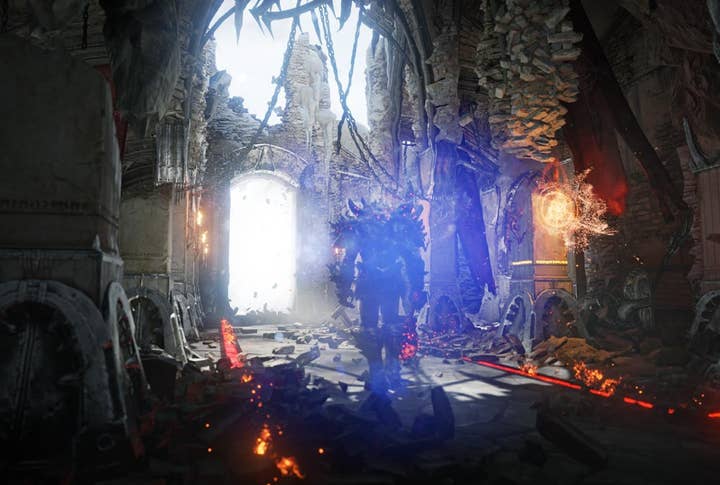Epic on Unreal Engine 4: "You have to eat your own dog food"
We talk with Epic president Mike Capps about his studio's approach and the evolving games business
CARY, North Carolina - Epic Games continues to celebrate 20 years of game development. At E3 this year, the independent game studio is showing off Unreal Engine 4 to developers and press. The studio also has a new iPad game, Infinity Blade Dungeons, playable for the first time for attendees (the game made its debut on the Apple iPad 3 stage in San Francisco in March). Dr. Mike Capps, president of the game studio, talks about Unreal Engine 4, the future of gaming and more in this exclusive interview.
It's two parts. One is we've made some good calls strategically, but nobody makes brilliant predictions of the future for 20 years straight. So some of it just comes from us realizing we made a mistake and then making a quick change. We totally missed mobile gaming, for example. Now we're a leader in the mobile space with the Infinity Blade franchise and Unreal Engine 3 running across mobile platforms. It's about being flexible, realizing where the business is moving and then executing very rapidly and jumping on top of it and being successful.
We're a leader in the console space, but in 2004 Gears of War was the first console game we had shipped in five years. So we don't always guess the trend, but I think we're really good at jumping in with both feet. Then our engine business helps us to sustain the business even when we don't have a hit game. With most independent studios if they have one game that's not a hit, they're really in trouble financially and they have to look for external funding or investment. We have not always had blockbuster game hits, but we always had the engine business to keep us afloat until the next game. And we've luckily had more successes than failures.
"We know the graphics are going to look great. The real challenge for us is to make it easier to make games"
Mike Capps
The idea of taking our high end engine to Web gaming didn't really make sense five years ago. There were engines running in the Web space, but it just wasn't the place you took a really high-end AAA game engine. We've just been really impressed with how quickly PC computing has caught up to high-end consoles and how well the Flash compiler works. It was a big surprise that it happened as fast as it did for us, but the idea of being able to run on Flash anywhere has been great for the engine. That just opens up all sorts of possibilities for licensees.
We have five different projects in development - most of them not announced right now. Here in Raleigh this has been the main Gears of War studio as well as the main engine studio. Infinity Blade Dungeons and Fortnight are being developed here as well. People Can Fly (in Poland) is working on an unannounced project. They made Bulletstorm. Chair just released Clash Mob on Infinity Blade 2 and they've got some more tricks up their sleeve for Infinity Blade 2 and then a new game that's on the way.

The easy thing to notice whenever we do a new technology refresh are the great graphics, but that's our bread and butter. We know the graphics are going to look great. The real challenge for us is to make it easier to make games. As the content gets more complex to make, our goal is to make it more accessible and faster to make so that we don't need ten times as many people to make the next game on a next generation console than we do today.
It's really been about re-engineering from the front-end the entire user experience so that's it's built around lots of people cooperating very efficiently to make game content. We cut out as many of the arcane steps in the process that we could. Unreal Engine 4 has re-architected every step of the way for fast content creation. Users are going to see pretty graphics, which are great because they are pretty. But our message to developers is that if I could make a game today with it, I'd prefer it to Unreal Engine 3 because it's so much faster, and then it has the sexy new graphics features and other things to boot.
Yeah. Exactly. Our goal is to keep bringing budgets down for making games because we get more games and more game content that way. Iteration is really the key to good games. You build something you think is going to be fun and you try it out and if it's not, you just keep trying again. The faster that cycle works, the more likely you are to get something that's really fun.
For us, Kismet was a big step towards empowering level designers with Unreal Engine 3 to get them to be able to do some of that iteration themselves. They could see what it would be like to kick open the door and have two locust grunts come out from either side and play it themselves. The things we're doing to empower content creators this time around, and to accelerate that iteration loop, are going to have a pretty profound impact on how fun games get quickly.
"All the most successful game engines have been ones that had a game that was driving their creation…a real game, a serious game that pushed the team to do what they needed to do"
Mike Capps
Microsoft coined the phrase, "You have to eat your own dog food." Their Outlook team uses the Outlook beta to send email and sometimes it crashes. The people who are eating the dog food right now are our game teams who are building Unreal Engine 4 games while the engine is a work-in-progress. It's not done, but having a game that uses Unreal Engine 4 is really crucial in the games business. All the most successful game engines have been ones that had a game that was driving their creation…a real game, a serious game that pushed the team to do what they needed to do.
Our guys work hand-in-hand to have the needs of a game drive what the engine can actually do. We've been doing this for over a decade, so we know how to make systems more generic so they could apply to other games and we're listening to our licensees about what their needs are. But it's very much driven by our game development process.
You have this leapfrogging of cycles with consoles and PCs, where a console is as good as a very fast PC at the beginning and then by the end PCs blow them away in terms of performance. It's a natural process. From a graphics-capability perspective, PCs are amazing right now. From a business perspective, it's been really great to see that there can be successful business on the PC again, and not just subscription-based MMOs. There are also free-to-play games that are doing really, really well.
Skyrim sold millions of copies on PC as a single-player only game. That's really big for the PC space. Minecraft is the shot-in-the-arm it needed to show developers that you can make money on the PC. It's not just a wasteland of piracy; it's actually a place where you can make quality content and people will pay for it. We're building a PC-targeted game right now and I love that. It makes me really happy to be able to say that again.
I do think that the traditional publisher model is breaking down very quickly. Game developers publishing directly to the Web seem to do quite well without a publisher, without a traditional marketing budget and boxed goods. There are rumors abounding for a next-gen console where digital fits in. Kickstarter is breaking down the publisher model even more. I'm so glad that Brian Fargo is making Wasteland. I jumped in big for that. I wanted it to get made and that's wonderful that he doesn't have to convince a publisher that there are people out there because now the people can tell him they're interested.
I hope this first batch of Kickstarter games are successful because it would be really bad for all the other ones if the first few did poorly or made a bad game. These guys are the Vanguard of a new business model and they have a lot of responsibility to really do it right. The breakdown of the publisher model and going to digital is probably the biggest thing that's happening. It's going to take years for that to really play out. It's not just going to be Tribes off in a corner and everybody else still making big console games. There are going to be tons of free-to-play games completely upending the way that we make games, which is great.
That's a good question. We haven't really said what we're doing with Fortnite or what platforms, but I can say that five years ago we just would have assumed it was a console game and would have never even thought about it in another space. The same thing with Infinity Blade Dungeons. That would have been a Diablo-like console game. Now the first thing one thinks about is "Is this a PC game? Is this a global game or just a North American game? Will it work in Asia or Europe? What's the cell phone market for this?" It completely changes the way we think about making games.

